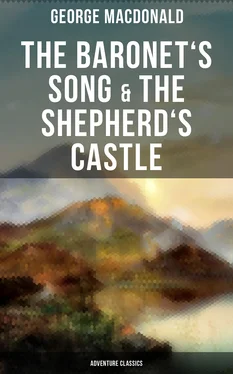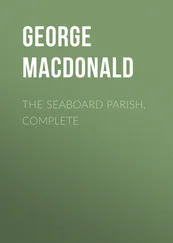"I see the young vagabond is as impertinent as he is vicious," he said at last, finding that to no interrogation could he draw forth any other response than a smile. "Here Angus,"—and he turned to the gamekeeper—"take him into the coach-house, and teach him a little behaviour. A touch or two of the whip will find his tongue for him."
Angus seized the little gentleman by the neck, as if he had been a polecat, and at arm's length walked him unresistingly into the coach-house. There, with one vigorous tug, he tore the jacket from his back, and his only other garment, dependent thereupon by some device known only to Gibbie, fell from him, and he stood in helpless nakedness, smiling still: he had never done anything shameful, therefore had no acquaintance with shame. But when the scowling keeper, to whom poverty was first cousin to poaching, and who hated tramps as he hated vermin, approached him with a heavy cart whip in his hand, he cast his eyes down at his white sides, very white between his brown arms and brown legs, and then lifted them in a mute appeal, which somehow looked as if it were for somebody else, against what he could no longer fail to perceive the man's intent. But he had no notion of what the thing threatened amounted to. He had had few hard blows in his time, and had never felt a whip.
"Ye deil's glaur!" cried the fellow, clenching the cruel teeth of one who loved not his brother, "I s' lat ye ken what comes o' brakin' into honest hooses, an' takin' what's no yer ain!"
A vision of the gnawed cheese, which he had never touched since the idea of its being property awoke in him, rose before Gibbie's mental eyes, and inwardly he bowed to the punishment. But the look he had fixed on Angus was not without effect, for the man was a father, though a severe one, and was not all a brute: he turned and changed the cart whip for a gig one with a broken shaft, which lay near. It was well for himself that he did so, for the other would probably have killed Gibbie. When the blow fell the child shivered all over, his face turned white, and without uttering even a moan, he doubled up and dropped senseless. A swollen cincture, like a red snake, had risen all round his waist, and from one spot in it the blood was oozing. It looked as if the lash had cut him in two.
The blow had stung his heart and it had ceased to beat. But the gamekeeper understood vagrants! the young blackguard was only shamming!
"Up wi' ye, ye deevil! or I s' gar ye," he said from between his teeth, lifting the whip for a second blow.
Just as the stroke fell, marking him from the nape all down the spine, so that he now bore upon his back in red the sign the ass carries in black, a piercing shriek assailed Angus's ears, and his arm, which had mechanically raised itself for a third blow, hung arrested.
The same moment, in at the coach-house door shot Ginevra, as white as Gibbie. She darted to where he lay, and there stood over him, arms rigid and hands clenched hard, shivering as he had shivered, and sending from her body shriek after shriek, as if her very soul were the breath of which her cries were fashioned. It was as if the woman's heart in her felt its roots torn from their home in the bosom of God, and quivering in agony, and confronted by the stare of an eternal impossibility, shrieked against Satan.
"Gang awa, missie," cried Angus, who had respect to this child, though he had not yet learned to respect childhood; "he's a coorse cratur, an' maun hae's whups."
But Ginevra was deaf to his evil charming. She stopped her cries, however, to help Gibbie up, and took one of his hands to raise him. But his arm hung limp and motionless; she let it go; it dropped like a stick, and again she began to shriek. Angus laid his hand on her shoulder. She turned on him, and opening her mouth wide, screamed at him like a wild animal, with all the hatred of mingled love and fear; then threw herself on the boy, and covered his body with her own. Angus, stooping to remove her, saw Gibbie's face, and became uncomfortable.
"He's deid! he's deid! Ye've killt him, Angus! Ye're an ill man!" she cried fiercely. "I hate ye. I'll tell on ye. I'll tell my papa."
"Hoot! whisht, missie!" said Angus. "It was by yer papa's ain orders I gae him the whup, an' he weel deserved it forby. An' gien ye dinna gang awa, an' be a guid yoong leddy, I'll gie 'im mair yet."
"I'll tell God," shrieked Ginevra with fresh energy of defensive love and wrath.
Again he sought to remove her, but she clung so, with both legs and arms, to the insensible Gibbie, that he could but lift both together, and had to leave her alone.
"Gien ye daur to touch 'im again, Angus, I'll bite ye—bite ye—BITE YE," she screamed, in a passage wildly crescendo.
The laird and Fergus had walked away together, perhaps neither of them quite comfortable at the orders given, but the one too self-sufficient to recall them, and the other too submissive to interfere. They heard the cries, nevertheless, and had they known them for Ginevra's, would have rushed to the spot; but fierce emotion had so utterly changed her voice—and indeed she had never in her life cried out before—that they took them for Gibbie's and supposed the whip had had the desired effect and loosed his tongue. As to the rest of the household, which would by this time have been all gathered in the coach-house, the laird had taken his stand where he could intercept them: he would not have the execution of the decrees of justice interfered with.
But Ginevra's shrieks brought Gibbie to himself. Faintly he opened his eyes, and stared, stupid with growing pain, at the tear-blurred face beside him. In the confusion of his thoughts he fancied the pain he felt was Ginevra's, not his, and sought to comfort her, stroking her cheek with feeble hand, and putting up his mouth to kiss her. But Angus, utterly scandalized at the proceeding, and restored to energy by seeing that the boy was alive, caught her up suddenly and carried her off—struggling, writhing, and scratching like a cat. Indeed she bit his arm, and that severely, but the man never even told his wife. Little Missie was a queen, and little Gibbie was a vermin, but he was ashamed to let the mother of his children know that the former had bitten him for the sake of the latter.
The moment she thus disappeared, Gibbie began to apprehend that she was suffering for him, not he for her. His whole body bore testimony to frightful abuse. This was some horrible place inhabited by men such as those that killed Sambo! He must fly. But would they hurt the little girl? He thought not—she was at home. He started to spring to his feet, but fell back almost powerless; then tried more cautiously and got up wearily, for the pain and the terrible shock seemed to have taken the strength out of every limb. Once on his feet, he could scarcely stoop to pick up his remnant of trowsers without again falling, and the effort made him groan with distress. He was in the act of trying in vain to stand on one foot, so as to get the other into the garment, when he fancied he heard the step of his executioner, returning doubtless to resume his torture. He dropped the rag, and darted out of the door, forgetting aches and stiffness and agony. All naked as he was, he fled like the wind, unseen, or at least unrecognized, of any eye. Fergus did catch a glimpse of something white that flashed across a vista through the neighbouring wood, but he took it for a white peacock, of which there were two or three about the place. The three men were disgusted with the little wretch when they found that he had actually fled into the open day without his clothes. Poor Gibbie! it was such a small difference! It needed as little change to make a savage as an angel of him. All depended on the eyes that saw him.
He ran he knew not whither, feeling nothing but the desire first to get into some covert, and then to run farther. His first rush was for the shubbery, his next across the little park to the wood beyond. He did not feel the wind of his running on his bare skin. He did not feel the hunger that had made him so unable to bear the lash. On and on he ran, fancying ever he heard the cruel Angus behind him. If a dry twig snapped, he thought it was the crack of the whip; and a small wind that rose suddenly in the top of a pine, seemed the hiss with which it was about to descend upon him. He ran and ran, but still there seemed nothing between him and his persecutors. He felt no safety. At length he came where a high wall joining some water, formed a boundary. The water was a brook from the mountain, here widened and deepened into a still pool. He had been once out of his depth before: he threw himself in, and swam straight across: ever after that, swimming seemed to him as natural as walking.
Читать дальше












